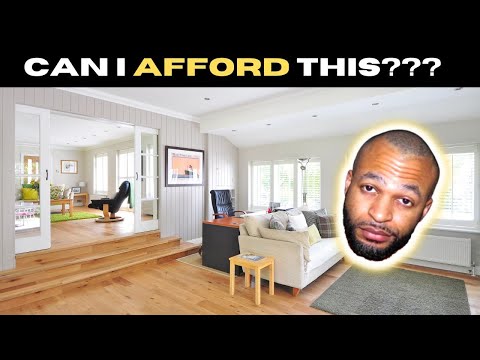If I Make 100K a Year How Much House can I Afford in 2024? Your income undoubtedly plays an integral role in determining the value of the house you can afford. This piece aims to elucidate, “if I make 100K a year, how much house can I afford?” By exploring purchasing power influenced by annual income, we take a prudent dive into your potential home-buying capacity. It’s all about the numbers, folks!
Dwelling on the Numbers: If I Make 100K a Year How Much House Can I Afford?
If you’re like many people, you’ve probably wondered, “if I make 100K a year, how much house can I afford?” The answer isn’t simply a singular number. Various factors come into play such as your existing debt, credit score, mortgage type, down payment, and even your lifestyle choices.
On average, a classic rule in the mortgage world—the 28% rule—would suggest that someone earning a base salary of $100K could afford a property valued somewhere between $350K and $500K. However, this figure may fluctuously vary, depending on financial factors and personal situations.

Affordability Factors: Income, Debt, and Mortgage Payments
Making a centennial grand a year doesn’t automatically mean you’re in the clear to purchase a half-a-million-dollar home. Lenders consider a myriad of items before determining your loan potential. One crucial component they look at is your debt-to-income ratio.
Your debt-to-income ratio is the percentage of your income that goes towards repaying your debts, such as student loans, car payments, or credit card bills. Lenders typically look for a ratio of no more than 36% to ensure you can comfortably manage your mortgage payments along with your existing financial obligations. So, folks, the less debt you owe, the more house you can afford!

| Annual Salary | Affordability on House | Monthly Home Expenses* | Down Payment | Note |
|---|---|---|---|---|
| $100,000 | $350,000 – $500,000 | $2,333 | 5% – 20% | According to the 28% rule, no more than 28% of gross income should be used on housing expenses |
| $108,000 | $500,000 | $3,000 | 5% – 20% | To afford a $500K house, one needs to follow the 28/36 rule and make at least $108,000 per year |
| $100,000 | N/A | N/A | N/A | A family of four needs to make $100,000 to afford basic living expenses in some U.S states |
| $50,000 | $175,000 – $250,000 | $1,167 | 5% – 20% | Yearly housing costs should not exceed $14,000 adhering to safe debt guidelines |
| $120,000 | $420,000 – $600,000 | $2,800 | 5% – 20% | Yearly housing costs should not exceed $33,600 per year adhering to safe debt guidelines |
Breaking Down the Financials: How Much House Can I Afford with 100K Salary
Understanding the numerical breakdown can provide clearer insights into how your $100K salary translates into home purchasing power. Safe debt Guidelines can be a useful reference. For someone earning $100K, this implies your total yearly housing costs shouldn’t exceed $28,000, or $2,333 a month. Putting a down payment of about 5% to 20% into this equation, you’d be gazing at potential homes priced in the neighborhood of $350K to $500K.
Whether you choose a fixed-rate mortgage or an adjustable-rate mortgage can also make a significant difference in your affordability. A fixed-rate mortgage provides predictability with consistent monthly mortgage payments. Meanwhile, an adjustable-rate mortgage may start with lower monthly payments that could potentially increase over the loan period.

Income Variations: I Make $36,000 a Year, How Much House Can I Afford?
Ah, but what if you’re bringing in a little less bacon? Let’s say you make $36,000 a year. With the standard 28/36 rule, you’d ideally be looking at houses in the ballpark of $108,000, given your annual income would allocate around $1,000 monthly towards housing expenses.
However, despair not! Lower-income households may be eligible for various concessions and grants. Assistance programs do exist for first-home buyers and low-income earners that could elevate your buying power, enabling you a broader range of housing options. You just need to do due diligence. It’s never a one-size-fits-all scenario, folks!

A Closer Look at the $40,000 Wage Bracket: How Much House Can I Afford?
Now, let’s say you’re earning slightly more—$40,000 a year. The 28% rule allocates $933 monthly to your housing expenses. So, how much house can you afford? Safe to say, it would be slightly more expensive than for those earning $36,000 a year, but it also heavily depends on other elements, including your credit score, current debts, and savings commitment.
A higher credit score could result in lower interest rates on your mortgage, effectively increasing the range of the house you’d be able to afford. Furthermore, reducing debt also increases the amount potentially available for a mortgage payment. It’s always a multifaceted financial equation to solve.
House Hunting at Higher Incomes: If I Make $90,000 a Year, How Much House Can I Afford?
As you rise up the income ladder, naturally, it inflates your housing affordability bracket. Utilizing the 28% rule again, an individual bringing home $90,000 annually would allot about $2,100 per month towards housing expenses, translating to a roundabout figure of an affordable home between $430K and $645K.
However, definitions of ‘affordability’ can differ for different income groups. You might desire a home that matches your lifestyle—maybe a bigger backyard or a plush kitchen—and those amenities can come with an upscale price tag. Understanding your wants and needs, and aligning them financially makes all the difference in your home-buying journey.

Making the Most of Your Buy: Tips for Maximizing Your Home Affordability
Maximizing your purchasing power isn’t solely centered on having a six-figure salary. Adopt these savvy strategies to get the best deal possible:
– Budget Wisely: Be conscious about where your money goes. Limiting unnecessary expenses can increase your savings for a down payment, effectively reducing your mortgage. And remember, every little bit counts!
– Improve Your Credit Score: The better your credit score, the lower your mortgage interest rates. Maintaining a healthy score becomes a gateway to unlocking better financial fortunes.
– Pay off debts: Reduce your debt as much as possible before applying for a mortgage. Your debt considerably affects your debt-to-income ratio, a key metric that lenders peruse when offering loans.
– Negotiate for better mortgage rates: Don’t settle for the first mortgage rate presented to you. Shop around, compare, and negotiate to get the best deal available in the market.
Bridging the Gap: The Relationship Between Income, Lifestyle, and Home Affordability
Speaking strictly numbers, we’ve covered how your income contributes to the price of the house you can potentially afford. However, it’s also essential to consider your lifestyle choices when preparing financially for homeownership.
Your standard of living impacts your affordability. Recreational activities, vacation plans, or even personal hobbies can require a slice from the financial pie, potentially influencing the funds available for your mortgage payments. Hence, it’s advisable to tread with caution, ensuring comforts within your affordability.
Adapting to the Financial Reality: Tailoring your Home-buying Strategy to your Salary
The trick to successful homeownership is to mold your home-buying strategy according to your income. If your current salary limits your affordability, there are numerous routes you can take to increase your purchasing power. Here, you may need to consider additional income sources, such as side jobs or freelance work, or strategies to reduce living expenses like downsizing your current accommodation or commuting to work.
You see folks, homebuying is more than just a question of “if I make 100k a year, how much house can I afford?” It’s a thoughtful journey that involves careful planning and ongoing commitment.
Your Money, Your Home: A Novel Approach to Property Ownership
The journey of home-buying begins with answering the question, “How much home can you afford?” Yet, it doesn’t stop there. While your income lays a direct impact on your options, it’s the unconventional management of your finances that can make the real difference. Becoming a homeowner is not just about affording your house; it’s also about retaining the quality of life you desire.
So, remember folks, while your income is an essential factor, it is not the determinant. Your financial decisions will ultimately pave the way. So make sure you put each penny where it counts the most, not only in becoming a homeowner but also in maintaining a comfortable lifestyle.
In the grand scheme of everything, the overpowering thought of “if I make 100K a year, how much house can I afford?” becomes less daunting. Tailoring the financial aspects of your life and dabbling in sound financial strategies will put you on a firm footing towards owning your dream house, regardless of the number stated on your paycheck.
Your mortgage journey awaits you, no matter the size of your salary. Salary brackets may present various challenges, but there are flexible solutions—whether it’s using a tool to download Bing to research financial lenders or perform morning workouts on a tight budget using a home-friendly suspension trainer. It’s all about playing your financial cards right and striking the perfect balance. Remember, your dream house is simply a practical financial strategy away. Happy house hunting!
What mortgage can I afford with 100K salary?
Well, with a 100K salary, you should be able to afford a mortgage around $250,000 – $350,000. That’s based on the rule of thumb that your monthly housing expenses shouldn’t exceed 28% of your gross monthly income.
Can I afford a 500K house on 100K salary?
Taking home a 100K salary tends to make a $500,000 house a tough cookie to bite into; it’s not exactly trivial. All in your income, debt, credit score and down payment play a vital role, so keep those in check!
Can a family of 4 live on 100K a year?
Living on 100K a year for a family of 4? That’s a question that screams, “It depends!” Local living costs, your lifestyle choices, and your spending habits will determine that, in the long run.
How much house can I afford if I make $120 000 a year?
If you make $120,000 a year, a house worth around $300,000 – $420,000 might be just your alley. Remember, though, every circumstance is different.
Can I afford a 300k house on a 100K salary?
A 300K house on a 100K salary? That’s a balancing act worth considering. It’s importantly to keep monthly household expenses within 28% of your gross income.
What house can I afford on 90k a year?
If you’re salaried at 90K a year, you might be looking towards a house in the ballpark of $225,000 – $315,000. Building up a healthy down payment can certainly help out.
Can I afford a 600k house if I make 100K a year?
A 600k house with a 100K income? Now, that’s walking a fine line. It’s not impossible but it’ll be a squeeze, especially when you factor in other debts and expenses.
Can I afford a million dollar home if I make 100K?
Eyeballing a million-dollar home on a 100K salary? That’s a tall order. A higher income or a hefty down payment would be needed.
Can I afford a 600k house on 100K salary?
Is a 100K salary low income? Well, I’ll tell you what! It’s far from it, especially as the national median income hovers around $60,000.
Is 100k a year low income?
Looking for what’s considered an upper-class salary? Generally, that would mean earning twice the national median income, landing somewhere north of $120,000.
What salary is considered upper class?
Want to break 100K yearly salary down into an hourly wage? Now, imagine a 40-hour work week, subtract a couple of weeks for vacation, and you’ll see yourself hovering around 50 bucks an hour.
How much is 100k a year hourly?
A 500K house on a 120K salary? It’s a little closer to reach but still a stretch, considering various factors such as other debts, down payment, and credit score.
Can I afford a 500k house on 120k salary?
Now, $36,000 a year? Let’s be real, we’re talking about a more modest home in the range of $90,000 – $126,000. You gotta live within your means!
How much house can I afford if I make $36,000 a year?
Wondering about the 28/36 rule? It’s a financial golden rule – don’t spend more than 28% of your gross income on total housing expenses or more than 36% on total debt service.
What is the 28 36 rule?
How much income for a 500K house, you ask? Easily said, you’d need to be earning somewhere around $120,000 a year – ballpark figures.
How much salary do you need for a 500k house?
Aiming to afford a 500K house? It’s not a pawl game! Bugs me to tell you, but be ready to aim for an annual income of around $120,000.



